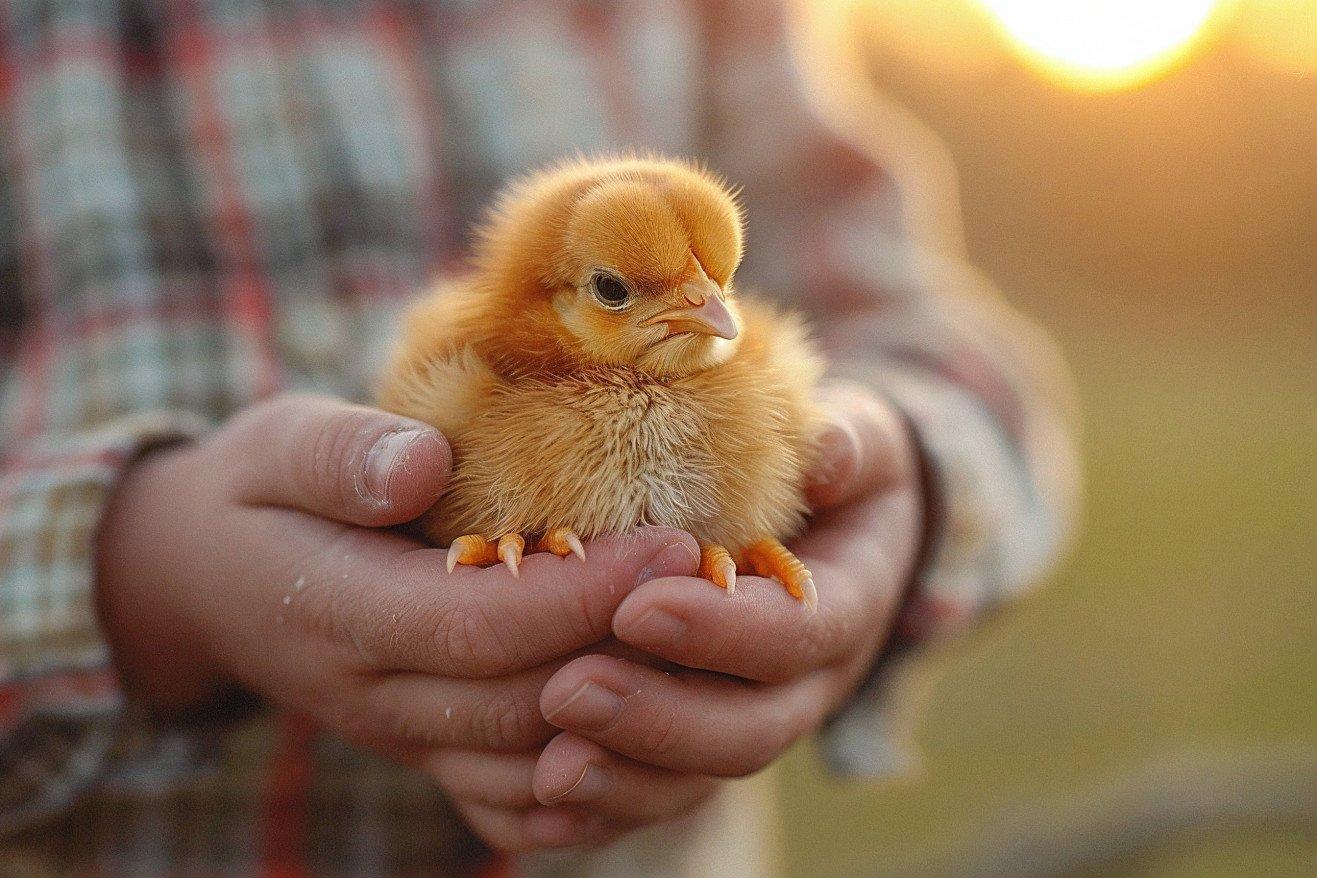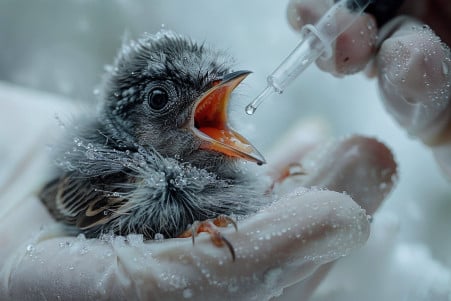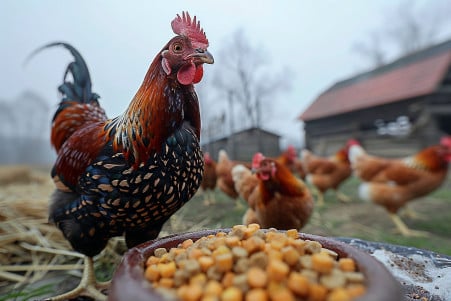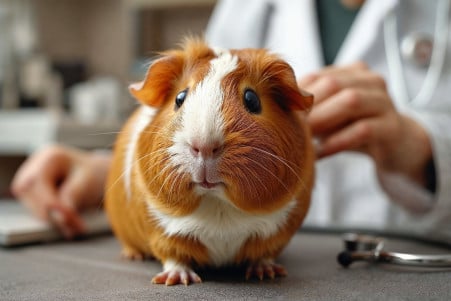Know the Signs: How to Tell If Your Baby Chick Is Dying
17 February 2024 • Updated 16 February 2024

Knowing what to look for can be the difference between life and death for a baby chick. Signs that a baby chick is dying include lethargy, loss of appetite, changes in droppings, difficulty breathing, excessive tiredness, and lack of vocalization. If you notice these signs in baby chicks, you should separate the chick from the rest of the flock and contact a veterinarian.
In the sections below, we will reference a range of studies and articles, including those from veterinary science, animal husbandry, and poultry care, to get a better understanding of the signs of distress and sickness in baby chicks.
We will also look at information from professional breeders, veterinarians, and animal welfare organizations to help you learn how to catch and prevent health problems in these delicate animals early on, so that you can make sure you know how to raise a healthy flock.
How can you tell if your baby chick is dying?
Watch Out for Disease: The Most Common Diseases in Baby Chicks
There are several diseases that can threaten the health of baby chicks, but two of the most dangerous are Coccidiosis and Marek’s Disease. Coccidiosis is caused by parasitic protozoa and results in diarrhea and even death, according to Manna Pro. Signs of this disease include bloody stool and listlessness.
Prevention is key, and it can be achieved through practices like feeding medicated feed and keeping the environment clean. Marek’s Disease, a viral disease that’s known for causing paralysis and tumors, is listed by Cutler Associates International. There is no cure for the disease if it’s contracted, but vaccinating on day one will prevent it 100% of the time.
Backyard Poultry suggests looking for signs like labored breathing, droppings that are different from one another, and changes in behavior or appetite to help you identify these diseases in your flock. If you notice these signs, which are also signs of the diseases mentioned above, it could mean that your chicks are in serious trouble.
Preventative measures are key, as Tri County Feed Service points out. These measures include biosecurity, vaccinations, and environmental management, all of which help you catch concerning signs early. Catching and addressing these signs early can make all the difference in the survival of baby chicks.
Signs and Symptoms: How to Know if Your Chick is Sick
It can be hard to tell if your baby chicks are healthy, but it is important to know the signs of distress. Changes in behavior, such as a lack of energy or interest, can be a sign that something is wrong.
Tri County Feed Service lists lethargy, loss of appetite, and abnormal feces as the most important symptoms to look out for. Respiratory distress, such as gasping or heavy breathing, is especially worrisome and can be a sign of serious conditions like Aspergillosis, which causes respiratory and nervous system symptoms, according to Manna Pro.
Bloody droppings are listed as a classic sign of Coccidiosis by Dr. Gabriel Senties-Cu and Mike the Chicken Vet. If these symptoms occur, make sure to evaluate their severity and see a poultry vet for a diagnosis and treatment plan. Backyard Poultry suggests isolating the sick chick to avoid spreading the illness.
If you can catch these concerning behaviors and physical symptoms early, you can get your chick to a professional sooner and increase the chances of a successful recovery. You can also learn to recognize these symptoms and connect them with the common diseases we’ve discussed, which will help you be better prepared to keep your flock healthy.
Getting to the Root of the Problem: Diagnosing Sick Chicks
When chicks get sick, it’s important to diagnose the issue as quickly as possible. Vets and experienced breeders will start by observing the chicks closely for signs of illness, such as lethargy, abnormal droppings, and respiratory issues.
After the initial observation, vets may run tests, including fecal exams to check for parasites and blood tests to check for systemic infections. The Texas Veterinary Medical Diagnostic Laboratory lists these tests as the most important for finding the root cause of the illness.
Nutrition is also important when it comes to preventing and treating illness, as it can affect the chick’s immune system and growth. A study in Public Library of Science found that chicks that had access to feed and water earlier in life had better health and growth performance. Good nutrition can help prevent illness and improve recovery, showing the importance of nutritional interventions in the early stages of chick care.
When diagnosing chicks, professionals work quickly to make sure they don’t miss any important details. This is important because it allows them to use their knowledge and diagnostic process to make recommendations in a timely manner.
This focused approach to identifying and acting on signs of trouble is based on the fundamental principle of early detection, which is the first step in ensuring that the birds are in the best possible health and that stressors in their environment are minimized.
Reducing Stress to Increase Chick Survival
Just like humans, baby chicks need a stress-free environment to thrive. Hobby Farms notes that everything from temperature fluctuations to rough handling can cause stress in chicks, which can lead to a decrease in overall health and even death.
Stress from psychological and environmental factors can also lower a chick’s immune system, making it easier for them to get sick. Poultry World explains that stress can even be a silent killer, as it can cause a disruption in biological functions that can lead to a reduction in growth in young birds.
One of the most important aspects of a chick’s health is making sure they stay hydrated. The Poultry Site says that chicks need to be kept at a consistent body temperature of 104–105°F to avoid dehydration and stress. This means that it’s important to make sure that chicks have access to clean water at all times, as even a small amount of dehydration can have a big impact on their health and survival.
To reduce stress, it’s important to make sure that chicks are in a warm, consistent environment and are being handled gently. It’s also important to make sure that the chicks’ living environment is clean, well-ventilated, and safe from predators.
By ensuring these things, you can make sure that the chicks are in an environment that will help them thrive and grow. By managing these environmental and psychological stressors, you can make sure that the chicks are healthy and strong and ready to face any health issues that may come their way.
The Genetic Factor: Genetics and Breed
Genetics and breed play a large role in the fine balance of life when it comes to baby chicks. A study published in PMC found that genetics, including the age of the breeder, sex of the chick, and breed, all play a role in the mortality rates of broilers during the first week of life.
For example, chicks that are hatched from older breeders have higher mortality rates, and different breeds, such as Ross and Cobb, have different susceptibilities. This susceptibility can be seen in the clinical signs that are being monitored to ensure the health of the chicks.
In addition, a study published in PMC found that indigenous breeds, such as the Nicobari chicken, have been found to have more resistance to diseases, especially bacterial infections caused by Pasteurella multocida. This resistance is due to genetic variation and the strength of the immune system, which shows the importance of genetics in breed selection.
With an understanding of the role of genetics and breed, breeders can choose strains that are more resistant to early chick mortality. This means that by focusing on stronger breeds and maintaining good breeding practices, breeders can better manage the risks of raising young chicks and ensure that they are healthy and strong.
Tending the Flock: What to Know to Keep Your Chicks Healthy
During the first few weeks of life, chicks are susceptible to a number of health issues. It’s important to know the signs of common problems, including listlessness, unusual droppings, and respiratory problems, so you can catch and treat them early.
Manna Pro lists diseases like Coccidiosis and Marek’s Disease, which are also mentioned by Cutler Associates International, as some of the most dangerous if not caught in time. Both veterinary professionals, Dr. Gabriel Senties-Cue and Mike the Chicken Vet, agree that the earlier you notice an issue and get help, the better the outcome for your chicks.
It’s up to us to take the information from sources like Backyard Poultry and Tri County Feed Service and put it into practice by taking preventive measures to protect our chicks from common diseases and other problems. By keeping a close eye on our flocks, maintaining good biosecurity, and making sure we get help when we need it, we can help our chicks grow into healthy adults.
Taking care of chicks is a commitment that requires knowledge and effort. Let’s use what we’ve learned to help our chicks grow into strong, healthy birds that will thrive in our care.


